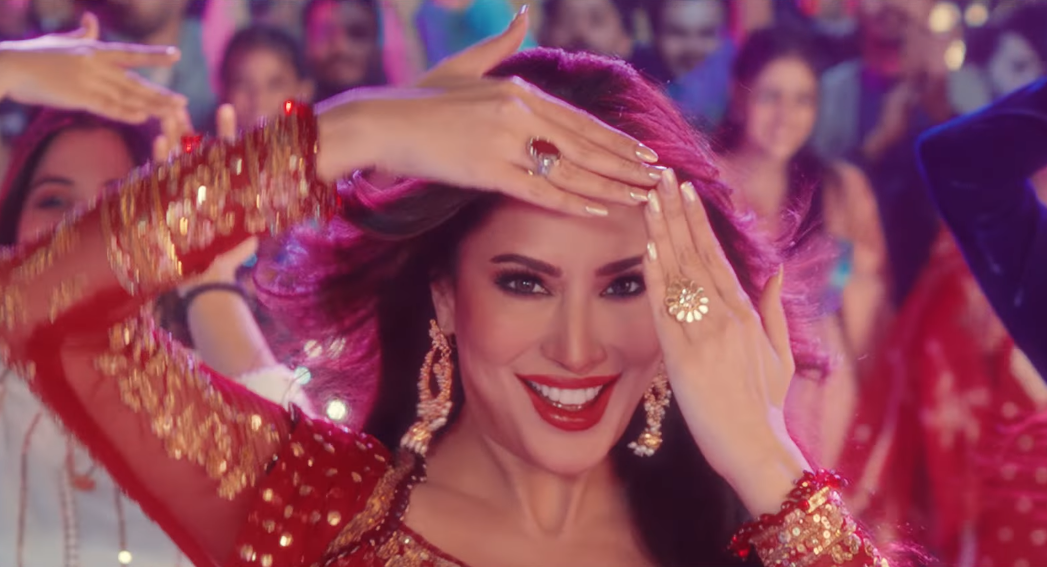KARACHI: Traditionally, Pakistani filmmakers and film lovers expect a variety of film programs to be released on the big screen on the occasion of Eid-ul-Fitr. A special hype can be attributed to Filmi songs as Chhoti Eid also marks the beginning of a new wedding magic and revives the demand for wedding dance songs.
Pakistani filmmaker Wajahat Rauf knows this impulse very well. From Chhalawa’s song of the same name to Parde Mein Rehne Do’s Peela Rung, the director’s last two Eid-ul-Fitr films have made no secret of their well-timed marketing of wedding songs. Now, the man at the helm of another Eid film has been named Shadi Song of the Year, according to an IG announcement from co-producer and Rauf’s wife Shazia Wajahat.
From the music catalog of Rauf’s fifth directorial, Daghabaz Dil, starring Mehwish Hayat, Ali Rehman Khan and Momin Saqib in lead roles, Gori Tera Jumka is yet another attempt to make the musical genre its forte. Although it follows its usual monotonous path, the song offers more reasons to protest than to praise or ignore.
A generation of Pakistanis grew up singing, dancing, or at least humming Bollywood songs like Gori Gori from Shah Rukh Khan’s legendary Mein Hoon Na. Whatever creative lyrical references to honesty enjoyed in 2004 remained in full force in 2017 when Kanika Kapoor joined hands with Meet Bros to bring us Chittiyaan Kalaiyaan.
In a more local and dated scene, Vital Signs’ Goray Rang Ka Zamana (1989) might have been undone by its 1991 follow-up, Sanwali Saloni Si Mehbooba, but it situates the music’s obsession with honesty within a longer story. While Vital Signs may have been unaware of the pressing discourses surrounding internalized racism and its associated stereotypes, Gori Tera Jumka and its ode to fairness encompasses a different consumer landscape.
There is no need to attribute malicious intent to the artists involved when they question the obvious freedom to romanticize the girl as lighter-skinned and more popular than in reality. However, in the case of Gori Tera Jumka and Rauf’s search for the perfect Shadi song, many reality checks are needed, starting with a deep reflection on the ubiquitous colorism and how it affects many people before, during and after the wedding season.
Taking responsibility for what is intended for public consumption does not necessarily mean taking care of a common man’s laundry. Industry insiders such as Gohar Rasheed and Amna Ilyas have repeatedly highlighted show business’s discriminatory attitude towards actors whose skin color is similar to that of the general population of Pakistan. Being guilty of colorism is not unique to Daghabaz Dil, but this case indicates a general disdain or disinterest in keeping up with new conversations and changes.
Even if these criticisms are set aside in favor of impractical idealism, i.e. H. Pakistani artists should use their platforms responsibly, Gori Tera Jumka believes, they encounter more rudimentary errors that prevent him from renaming the title of Shadi song of the year to win.
While all sub-genres of Filmi songs have intertwined characteristics, it can be said that a good wedding dance song is equally based on sights and sounds. It is not enough for Shadi songs to be viable off-screen, they must also find their way into dance rehearsals and eventually onto the dance floors of a Shadi hall.
Gori Tera Jumka suffers mainly from mediocre choreography, which resists the imitation of the ‘ simple’ and cannot be saved even by the stardom of the actors because there is a complete lack of chemistry on screen. The dance movements have no interest in following the song’s changing rhythms, a discontinuity that manifests itself most clearly in the chorus.
Dance movements alone say little about dance as an art form—movements that are performed for the sake of movement. But despite the quiet choreography, many songs manage to liven up the dance rehearsals, while Shadi visitors add the necessary spice to the catchy rhythms. It remains to be seen whether Gori Tera Jumka will suffer this fate.

